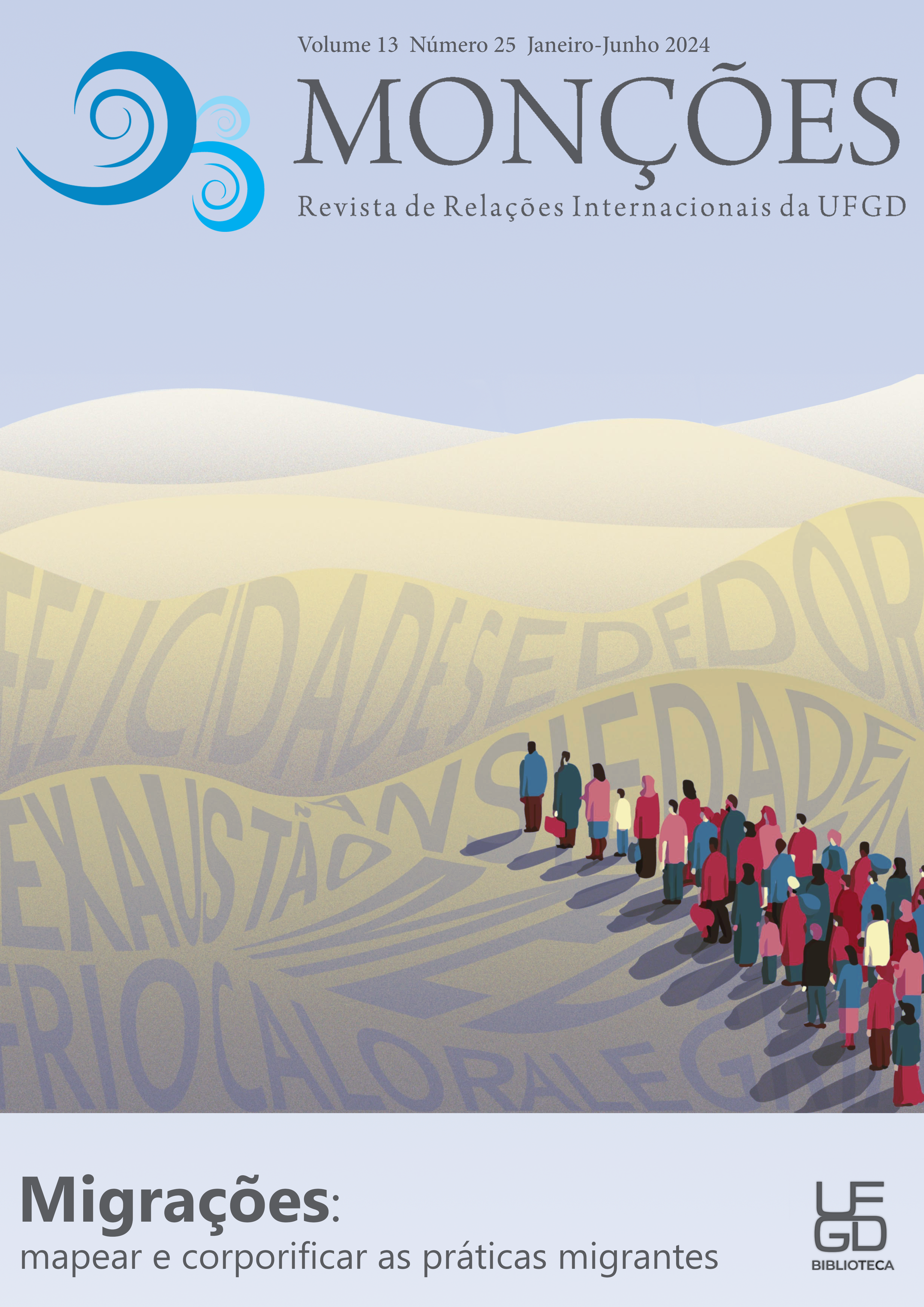Cultural maps of the mobility life of the E´ñepá indigenous group of Caruto: analyses of the relationship between represented spaces and life narratives of a perpetual displacement in time
DOI:
https://doi.org/10.30612/rmufgd.v13i25.17281Keywords:
space, territory, human mobilityAbstract
This article is a selection of results from a master's research of the Postgraduate Program in Societies and Borders of the Federal University of Roraima (UFRR). The text describes in a relational way the mobility process of a group of indigenous Venezuelans of the E'ñepá ethnicity in a "coming and going" between territories of origin and other local territories, national and international. The results provide evidence of high mobility dynamics and forms of occupation of space. The theoretical methodological framework is set within the current studies of contemporary human mobility, focused on the subjectivities of the participants contextually situated in time and space, on the multidimensional, multidirectional and interdisciplinary nature of the territory and space categories, as well as on the link that they establish memory and identity in favor of processes of social reconstruction, struggle, resistance and emancipation. At the end, we present the final considerations of the data analysis collected from three life stories and a workshop of social maps elaboration.
Downloads
References
ALAYÓN, Ángel; MARCANO, Oscar (coord.). El shock del efectivo en Venezuela. Caracas, VE: PRODAVINCI, 2018.
BRICEÑO, Marielys. Ka Ubanoko, atuar a fuerza de identidad. Revista SIC, [s. l.], n. 831, p. 31- 33, 2021.
CAMPOS, Ricardo. Sociabilidade, Medo e Estigma no Contexto Urbano Contemporâneo: O Bairro do Roger na Cidade de João Pessoa. Trabalho de Conclusão de Curso (Bacharelado em Ciências Sociais) Universidade Federal da Paraíba, João Pessoa, 2008.
CASTRO, Mariana Araújo de. Venezuelanas/os em Boa Vista: Práticas comunitárias, resistências e novas territorialidades na Ocupação Ka Ubanoko, 2021. PERIPLOS: Revista de Investigación sobre Migraciones, [s. l.], v. 5, n.1, p. 157-180, 2021. Disponível em: https://periodicos.unb.br/index.php/obmigra_periplos/article/view/34735. Acesso em: 4 dez. 2022.
DELEUZE, Gilles; GUATTARI, Félix. Mil platôs - capitalismo e esquizofrenia. Tradução tradução de Ana Lúcia de Oliveira e Lúcia Cláudia Leão. Brasil (Río de Janeiro): Editora 34, 1995. v. 2. (Coleção TRANS, v. 2).
DELEUZE, Gilles; GUATTARI, Félix. Mil platôs - capitalismo e esquizofrenia. Rio de Janeiro: Editora 34, 1996. v. 3. (Coleção TRANS, v. 3).
GIL, Antonio Carlos. Como elaborar projetos de pesquisa. 4. ed. São Paulo: Atlas, 2002.
GREEN, Nancy L. Trans-frontieres: Pour une analyse des lieux de passage. Socio- anthropologie, [s. l.], v. 6, 1999. DOI: 10.4000/socio-anthropologie.110. Disponível em: http://journals.openedition.org/socio-anthropologie/110;. Acesso em: 11 set. 2022. DOI: https://doi.org/10.4000/socio-anthropologie.110
HALBWACHS, Maurice. A memória coletiva. 2. ed. São Paulo: Editora Revista dos Tribunais, 1990.
HENLEY, Paul. Los E´ñepá (Panare). In: PERERA, Miguel (ed.). Los aborígenes de Venezuela. 2. ed. Caracas, VE: Total, 2011. p. 339-468.
INGOLD, Tim. The Perception of the Environment Essays on livelihood, dwelling and skill. London: Taylor & Francis e-Library, 2002.
INGOLD, Tim. Estar vivos ensaios sobre movimento, conhecimento e descrição. Petrópolis, RJ: Vozes, 2015.
LE GOFF, Jacques. História e memória. Campinas, SP: Editora da UNICAMP, 1990.
LUGO-MORIN, Diosey. Aves de caza del grupo indígena E´ñepa de Guaniamo. Venezuela. Ecosistemas, v. 16, n. 2, 2007, p. 86-97, 2007.
MARTÍN, Antonio. Fundamentación Teórica y uso de las historias y relatos de vida como técnicas de investigación en pedagogía social. Aula: Revista de Pedagogía de la Universidad de Salamanca, Salamanca, n. 7, p. 41-60, 1995.
MATTEI-MULLER, Marie. Notas sobre su situación presente y actualización Bibliográfica. In: PERERA, Miguel (ed.). Los aborígenes de Venezuela. Caracas, VE: Total, 2011. v. 2, p. 469-483.
POLLAK, Michael. Memória e identidade social. Estudos Históricos, Rio de Janeiro, v. 5, n. 10, p. 200-212, 1992.
VIDAL, Laurent; MUSSET, Alain; VIDAL, Dominique. Sociedades, mobilidades, deslocamentos: os territórios da espera. O caso dos mundos americanos (de ontem a hoje). Confins, [s. l.], n. 13, 30 nov. 2011. Disponível em: https://journals.openedition.org/confins/7274. Acesso em: 15 maio 2021. DOI: https://doi.org/10.4000/confins.7274
VILLALÓN, Maria. Los E´ñepá (Panare). In: FREIRE, Germán; TILLETTY, Aimé (ed.) Salud indigena en Venezuela. Caracas, VE: Ediciones de la Dirección Nacional de Salud Indígena, Ministerio del Poder Popular para la Salud, 2007. v. 1, p. 13-73.
ZIMMERMANN, Cíntia. Memória e Identidade da Praça Pádua Salles em Amparo. 2006. Dissertação (Mestrado) Faculdade de Arquitetura e Urbanismo. Universidade de São Paulo – SP, 2006.
Downloads
Published
How to Cite
Issue
Section
License
- Os autores e autoras mantêm os direitos autorais e concedem à revista o direito de primeira publicação, com o trabalho simultaneamente licenciado sob a Creative Commons Atribuição-NãoComercial-CompartilhaIgual 3.0 Brasil. que permite o compartilhamento do trabalho com reconhecimento da autoria e publicação inicial nesta revista.
- Autores e autoras têm autorização para assumir contratos adicionais separadamente, para distribuição não-exclusiva da versão do trabalho publicada nesta revista (ex.: publicar em repositório institucional ou como capítulo de livro), com reconhecimento de autoria e publicação inicial nesta revista.
- Autores e autoras têm permissão e são estimulados a publicar e distribuir seu trabalho online (ex.: em repositórios institucionais ou na sua página pessoal) a qualquer ponto antes ou durante o processo editorial, já que isso pode gerar alterações produtivas, bem como aumentar o impacto e a citação do trabalho publicado, porém invariavelmente com o reconhecimento de autoria e publicação inicial nesta revista.


